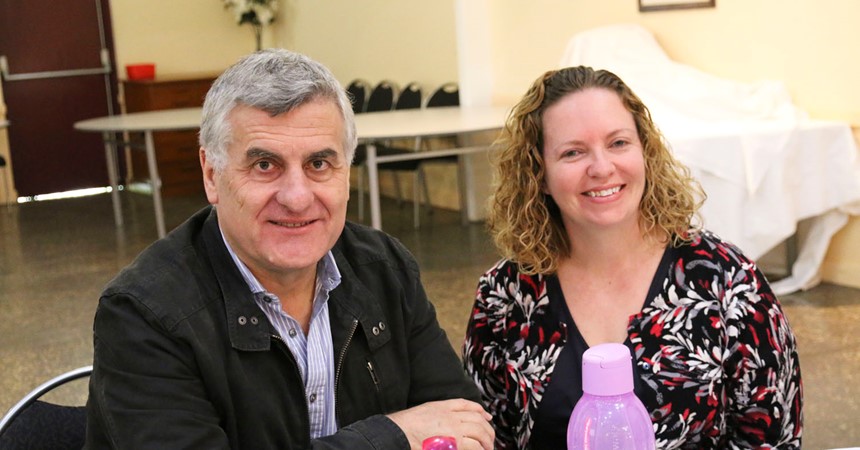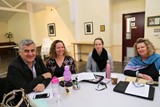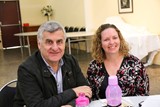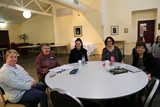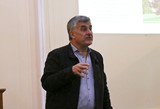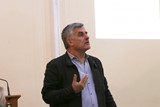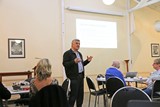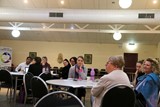Fr James ran seminars throughout the diocese which were attended by teachers and a number of pastoral workers. At one seminar, held at the Victor Peters Suite, Fr James led the group through four ideas about childhood and provided the opportunity for theological reflection on those ideas.
Each section invited attendees to reflect on different aspects of childhood.
A shift in the understanding of children and childhood
In developmental psychology prior to the 1980s children were seen as passive, incompetent and incomplete. Childhood was seen as a rehearsal for adult life (Shildkrout 1978). A shift then occurred looking at children as active agents engaged in their social context.
Karl Rahner was a Jesuit who was 20 years ahead of the pack in regards to thinking about children in a Catholic view. He believed that children have unsurpassable value. There is a whole world happening inside each child. He encouraged an emphasis on the dignity of children, seeing them as competent individuals.
The question now posed to the Catholic theological tradition is: What image of the child do we have as a people?
Children: Created in the image of God
Major theological themes of our Tradition have a great deal to contribute to reflection on childhood. They express the community’s understanding of its common life. They describe people’s lives and God’s presence within them.
Fr James lead the group in listening to Genesis 1. The groups then shared their view of the creation story and what stood out to them.
The creation story according to Fr James is not a story of manufacture but of relationship.
Creation is a source of delight to the creator. God wants only good for creation – and finds creation very good.
Humans are made in the image of God so that something can happen between God and creature. It is a very relational idea.
What does it mean for us to think about children as created?
Children: Living in the lost history of human brokenness
Attendees then looked at the history of human brokenness.
Every heart on earth is broken in some way. But society treats the broken differently. By embracing our brokenness, we can learn to relate to each other well.
Fr James shared an excerpt from Bryan Stevensen’s Just Mercy: “We are all broken by something. We have all hurt someone and have been hurt. We all share the condition of brokenness even if our brokenness is not equivalent.”
The paper co-written by Rev James McEvoy Children: Close to the Mystery of God states:
“Despite their immense dignity, many children live in poverty, war, violence and fractured human relationships. The forces of western culture, with the market economy as an integral element, mean that children can be treated as commodities and consumers on the one hand, and as burdens on the other- treated as having instrumental value rather than intrinsic value.
“Child abuse and neglect are terrible examples of violence from which some children suffer. Also of concern are the social forces that promote an inappropriate, early sexualisation of children.
“This range of social factors not only affects the environment in which a child develops, it also affects children’s self-understanding, influencing them inwardly- their sense of self is influenced by the brokenness to which they are subjected. This aspect of life is what Catholic theology has traditionally called original sin: that every person is born into the long history of sinful human choices. Human brokenness radically and interiorly affects children’s lives.”
Children: Touching the absolute mystery of God
Karl Rahner postulates that grace is uncreated. Grace is first and foremost God’s self-communication to the human person. This is in opposition to an early theological thought, that grace is a thing, given by God to the soul in quantities related to merit. Grace is interpersonal - it can be experienced.
An extract from Children: Close to the Mystery of God, describes how children experience the grace of God:
“From our earliest moments, every person lives within the offer of God’s love. Children are open to God, in the ordinary course of their journey they touch the mystery of God. We see the grace of God at work in their sense of wonder at the beauty of the sea, a landscape, or a flower.
“We see it in their enquiring minds, their search for knowledge, we see it when they are at play, exploring their imagination; we see it in their uncomplicated affection, trust and warmth; and we see it in their reaching out, in their sometimes surprising inclusion and care of others. The love of God experienced in childhood is never something that anyone leaves behind completely.”
Each group was then asked to share a story of an encounter with a child in which you were aware of God’s grace.
The day concluded with the questions: “What is our next step? How do we now relate to children with all of that in mind?”
Read Rev James McEvoy’s article in Aurora Magazine for more information on this topic.
